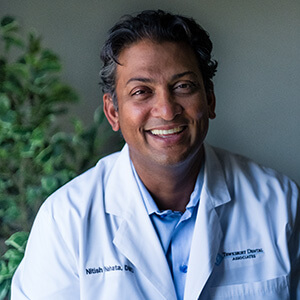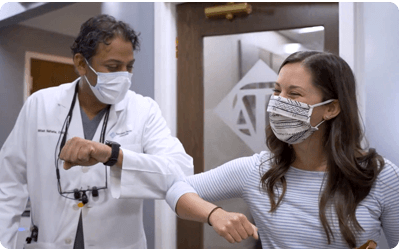Dental Extractions and Bone Grafts
Although we make every effort to help you keep your teeth for a lifetime, there may be times extractions are indicated. Wisdom teeth may be impacted, an orthodontist may request removal of teeth to create a more ideal result, or occasionally decay or gum disease can progress to the point that a tooth is impossible to restore.
For most of our patients, a tooth can be easily removed with local anesthetic (novocaine). Some of our more nervous patients find that anxiety medication (conscious sedation) is helpful. Occasionally, we refer to an oral surgeon who will provide intravenous (IV) sedation.
When you make an appointment with our oral surgeons, recovery is normally quick, and most people can return to work or normal activities the following day. We have found that swelling is rare (except after wisdom teeth removal) and can be controlled with icepacks and anti-inflammatory medications.
Bone Grafting is often done in conjunction with an extraction when an implant is planned. Bone grafting will ensure that the implant is placed in an ideal position. There are other indications for a bone graft and this is always an individualized recommendation.
Oral Biopsy
At every hygiene appointment in our Tewksbury location, we examine your entire mouth. If we notice any unexplained changes to the soft tissues we may suggest a biopsy to determine the underlying cause. It is the only conclusive method to determine whether a change in the soft tissue is cancerous. In most cases, we discover that the tissue changes are non-cancerous and may have been caused by cheek biting or irritation from other causes.
Only rarely do we find that such changes of the cheeks, gums or palate may be signs of a more serious problem – in which case early detection is extremely important.
The biopsy typically involves sending a very small portion of the lesion to the Pathology Lab at Tufts University for microscopic evaluation. We normally have the results in less than a week. With dental lesions, early diagnosis is very important.
What do our oral surgeons look for?
Generally, the tissue in your mouth is pink. If we spot an area that is very red or white we question those areas. If these color changes persist we do a biopsy to find out exactly why the color has changed. Mouth tissue is supposed to be pink. We question anything unexpected.
What is a Biopsy?
Can we detect cancer from a visual inspection of your mouth? Absolutely not! Cancer can only be detected by microscopic (or chemical) examination of the cells that make up the tissue.
A Biopsy is a test that involves the removal of a piece of tissue in order to examine the cells themselves under a microscope. Technically it is the removal of tissue from a living subject for the purpose of determining the presence or absence of disease.
Incisional Biopsy is when only a sample of the suspicious tissue is removed with preservation of the histological architecture of the tissue’s cells. This is sometimes referred to as a Core Biopsy. Excisional Biopsy is when an entire lump or suspicious area is removed for examination.
Needle Biopsy is when a sample of tissue or fluid is removed with a needle in such a way that cells are removed without preserving the histological architecture of the tissue cells.
Diagnosis: In the mouth white lesions can develop from chewing against the ridge tissue, from unexplained reasons, from cancerous changes, from precancerous changes, and from some explainable causes.
Because we see patients so regularly (every three or six months) our patients are diagnosed as early as is humanly possible. Early diagnosis generally limits the severity of any disease –, especially cancer. So if you are in the Greater Boston communities of Andover, Billerica, Chelmsford, and Wilmington, Massachusetts contact us to schedule your consultation!

Content Reviewed and Approved by Dr. Nahata.
Dr. Nitish Nahata is an accomplished dentist who recieved his doctorate in dentistry at Tufts University School of Dental Medicine and has honed his skills through years of practice in the North Shore and Merrimack Valley areas. As a member of the American Dental Association, the Massachusetts Dental Society, and the American Academy for General Dentistry, Dr. Nahata regularly participates in continuing education courses to enhance his knowledge and well-versed in the latest techniques and industry best practices.






